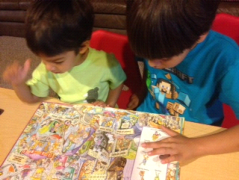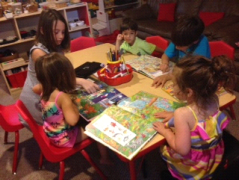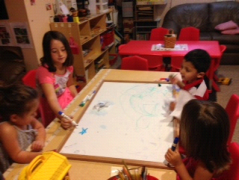- Small Group Setting:
The significance of enrolling a child in a family childcare includes benefits like providing a small group setting with individualized, caring, nurturing and home-style setting to children of all ages. It helps children to gain experiences of diverse cultures, interests, and ideas, languages, and the ability to develop a trusting personal relationship between family and provider.
- Home like Nurturing Setting:
The family childcare program plays a significant role in the early years of a young child’s life. A professional family childcare provider practice her early childhood education to teach young children, offer a warm, loving, small group, home cooked meals and a home like nurturing setting.
- Developmentally Appropriate:
The mixed-age group environment is a very normal and natural setting. The real world is full of people of all ages, just as in the child’s family, neighborhood, and community. Although schools and many daycare centers choose to segregate children by ages, this does not reflect real life.
- Provider Continuity:
Children are not moved to a new classroom and new teacher when they have a birthday or master a certain skill. It is difficult for parents and children to frequently have to transfer feelings of trust, comfort and affection to another caregiver.
- Siblings Together:
Builds leadership skills, social skills, and self-esteem allows when siblings to be cared are together.
- Individual Attention:
Family childcare providers are more accepting of uneven development. They are able to focus on each child as an individual rather than on just one child in a group of babies/children. Teachers of same age groups may be more tempted to expect children to learn at the same pace.
- Family/Sibling-Like Relationships:
These relationships can be fostered and are sources of trust, affection, comfort, and closeness. Research has shown that age is not an important factor for friendship choices.
- Experience Different Roles.
Each child has the opportunity to play various roles such as the youngest, middle, or oldest of the group, and therefore have exposure to different learning experiences. Social Development Enhanced. Each child has the opportunity to interact with a variety of behavior and continuously practice cooperative work and play skills (sharing, taking turns, expressing feelings, being helpful to others, etc.)
- Builds Leadership Skills and Self-Esteem.
The older children have the opportunity to lead, instruct, assume responsibility, and nurture others. They also strengthen their own skills and knowledge already acquired through the process of tutoring others.
- Learning from Other Children:
The younger children are exposed to play that is more complex, advanced language and educational activities by observing and imitating the older children. They often learn better from other children than from adults.
- Therapeutic for “At Risk” Children:
Children with difficulty following rules are encouraged to remind the younger ones of the rules and therefore often learn to obey and control their own behavior. Children with low self-esteem have the opportunity to refine their social skills and interact in a non-competitive way around the younger children.
- Minimizes Competitive Pressures:
Many children are at various learning levels and will have age-specific needs at different times. In mixed-age groups, they are not usually compared to their same-age peers and therefore will not usually feel the need to compete. “Waiting Time” is Minimized. Many activities are open–ended or coordinated for all ages – with all children involved. The older children are usually able to be helpful and assist with holding the door open, hand washing, putting away toys, setting the table, etc.
Develop Social Interactions: The family childcare has an ability to provide one to one individual attention to the young children and promotes plenty of opportunities for children to develop social interactions, not only with the provider but also between other mixed age small groups of children. Thus, also foster younger children and older children to learn from and teach each other.
- Conveniences for Parents:
The family childcare provides many conveniences for parents as compared to center-based facilities. Family childcare has a flexibility to open early and close late, accommodate seasonal and/or off- hours, less expensive in terms of tuition rates of center based program as well as making it easier for parents commute to work being close to their homes or being in the same neighborhood.
































